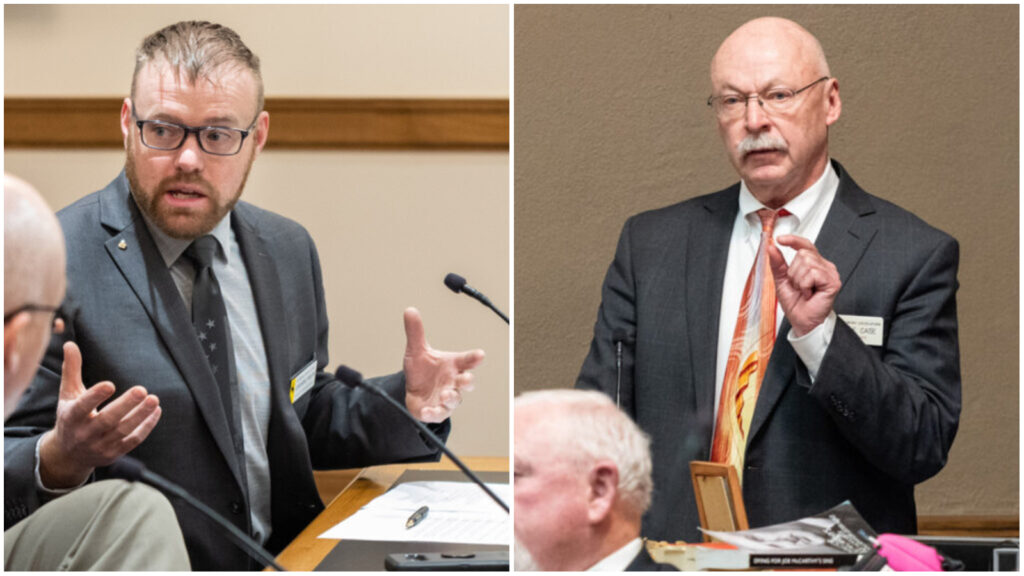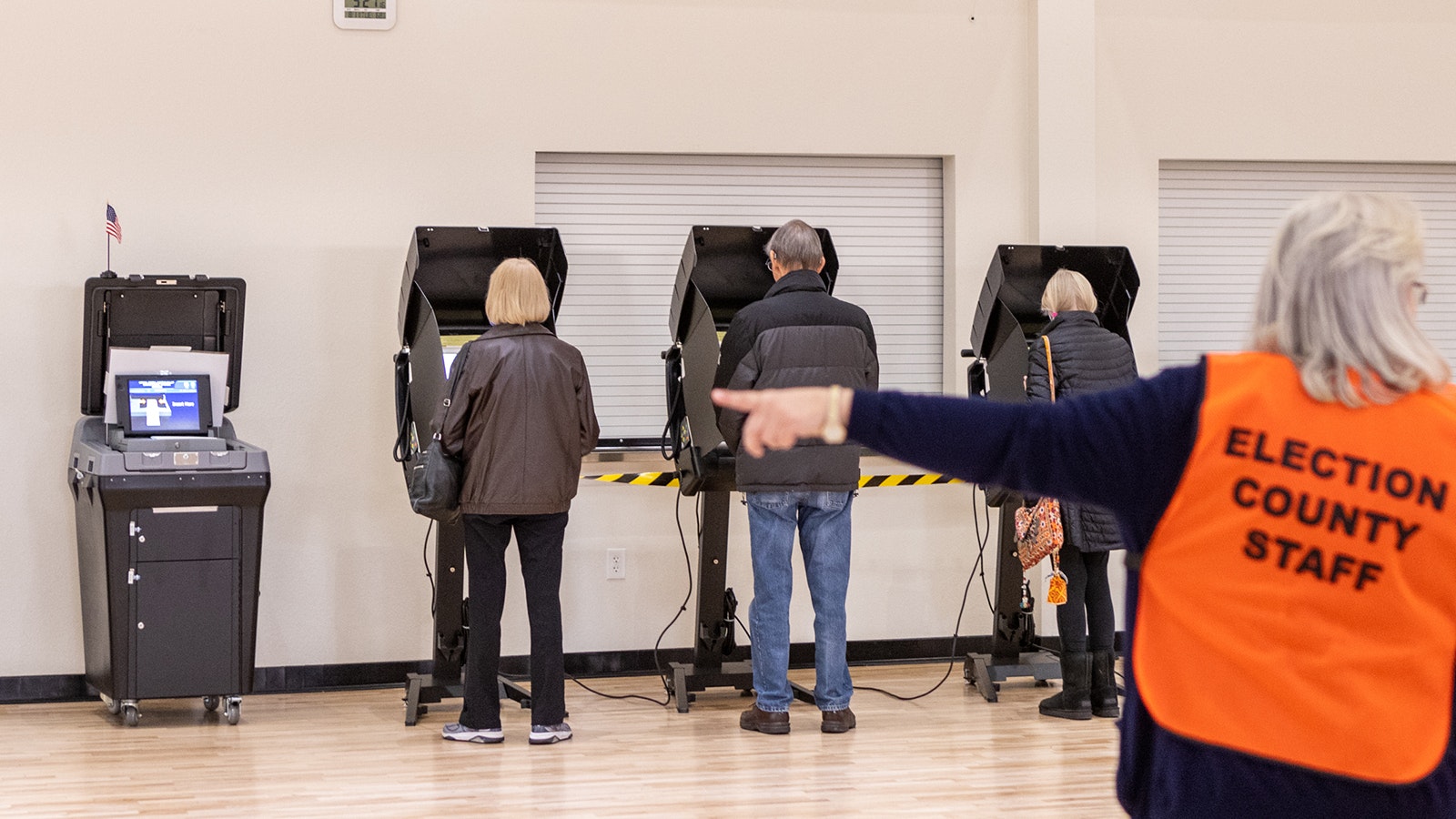Eliminating crossover voting for Wyoming primary elections, a hallmark goal for many Cowboy State conservatives, is moving closer to happening.
House Bill 103, which would set limits on when voters can change party affiliation prior to a primary election, passed through the Senate on second reading on Wednesday and moves closer to landing on Gov. Mark Gordon’s desk for a signature.
After favorable votes in the Wyoming Senate earlier this week, discussion of the controversial political practice continued Thursday.
Ending crossover voting, the process of changing one’s party affiliation to impact the primary election of another party, has been a defining talking point of hardline conservatives in Wyoming for at least the last five years. Opponents of the bill have argued that the ability to crossover on primary election day to vote and potentially influence another party’s outcome is an inherent right associated with voting and a tenant of free speech and democracy.
Sen. Bo Biteman, R-Sheridan, one of the leading members of the populist conservative movement in Wyoming, is leading the charge behind House Bill 103. He said it not only attempts to prevent voters from switching parties for the primary election, but also candidates from switching affiliation to run as Republicans, which is the state’s dominant party.
“Where it does happen is where you have a liberal, even a former Democrat, up to the point of filing, they’ll switch party affiliation to run in a Republican primary against a conservative Republican,” he said. “Now you’ve got a competitive primary between a liberal Democrat and a conservative Republican in a Republican primary. It’s going to incentivize them to switch over, change their party affiliation to play in a Republican primary.”

What It Does
HB 103 would prevent voters from changing political affiliation after the filing period for declaring political candidacy opens. The idea behind this timing is to prevent voters from changing party affiliation based purely based on which candidates are running.
Bills have been brought attempting to address crossover voting for some time, but the movement gained increased momentum after the 2018 Republican primary.
That year, many hardline conservatives complained that Gordon was assisted by many crossover voters in his primary election win.
Although it was proven that crossover voting did not affect the final outcome of that race, there was a sizable crossover presence in the 2022 U.S. House race between former congresswoman Liz Cheney and U.S. Rep. Harriet Hageman. Hageman still won by an overwhelming 38% of the vote.
Back From The Brink
Earlier this month, it looked as if the crossover ban movement had struck out again when HB 103 was rejected by the Senate Corporations, Elections and Political Subdivisions Committee.
Sen. Larry Hicks, R-Baggs, used past legislation as part of the reason to revive the bill on the Senate floor through a little-used rules mechanism.
On Thursday, a final third reading vote was delayed on the bill to give lawmakers more clarification on some of its language.
Sen. Cale Case, R-Lander, chairs the Corporations Committee and spoke against HB 103 on its first reading Tuesday. He described it as a “repugnant bill brought by a small minority of people” in an attempt to consolidate power.
“Absolute power corrupts absolutely,” he said. “This is corruption. It stomps out the voice of others.”
A Fix?
Although Sen. Tara Nethercott, R-Cheyenne, voted for HB 103, she said she does not expect the legislation to change anything and that if it becomes law, she expects it will be repealed by a future Legislature.
“It’s not a solution,” she said. “I believe there’s groupthink that believes it’s a solution. I think it’s all about satisfying a call to arms for a perceived solution that will occur.”
Only two of the 31 members of the Wyoming State Senate are Democrats.
Sen. Mike Gierau, D-Jackson, spoke to this disparity.
“Why would you change something that worked for everyone in this room?” he questioned. “The party that’s in the vast minority of the state, by disenfranchising a big amount of voters and pigeonholing the rest, the day when my party will ascend to a lower lofty place than it is now will come soon.”
Sen. Stephan Pappas, R-Cheyenne, also spoke against the bill and said it will cause Democrats and Independents to permanently switch over to the Republican Party.
A Major Issue?
Name recognition is a proven factor in elections and if a swing voter has already seen a candidate’s name once during the primary election, it could make them more likely to vote for that candidate again in the general election even if they have inclinations to a different political party than the candidate.
Under Wyoming elections law, organizations are recognized as major political parties when they have more than 10% of the vote in a general election for governor, secretary of state or U.S. House of Representatives.
Parties that lose major party status are not allowed to have their own ballot in the state’s primary elections.
Rep. Jeremy Haroldson, R-Wheatland, sponsor of the bill, has vowed that new voters and unregistered voters will still be able to register to vote after the candidate filing period opens.
Sen. Bill Landen, R-Casper, passed an amendment Wednesday he said would ensure that voters who turn 18 after the candidate filing period opens are allowed to register with a political party and vote in the primary.
Despite this amendment being created with the help of the Legislative Service Office, Biteman still opposed it Thursday, expressing concern that the changes made would conflict with the current definition of “elector” in Wyoming law.
“We drummed up the bill to the point where I don’t know what we just did,” he said.
Landen’s amendment was removed with a 16-15 vote.





